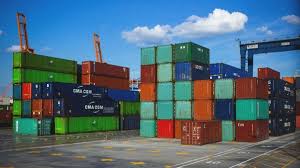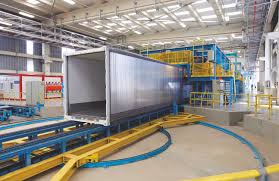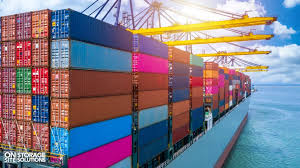![]()
If you’ve landed on this article page, you’re probably searching for a
good business idea—an idea that’s light on the pocket but heavy on
returns, promising both a fulfilling journey and potential profit.
|
How To Start A Shipping Container
Production Business in Nigeria
The Shipping Container Production and Supply Business is an
essential industry that plays a crucial role in the
transportation and logistics sector in Nigeria and Africa.
Shipping containers are durable, standardized steel boxes used
to store and transport goods internationally and domestically.
They have revolutionized global trade by providing a
cost-effective and secure method of shipping various products
across borders.
The business offers opportunities to cater to the growing demand
for shipping containers driven by the expanding global trade and
logistics sector. Shipping containers are essential for
international shipping, storage, and various applications,
including temporary structures, housing, and retail spaces.
Types Of International Shipping Companies In Nigeria
International shipping companies in Nigeria and Africa can be
categorized into different types based on the services they
provide. These include:
Freight Forwarders: These are companies that organize and
arrange the shipment of goods from one point to another,
including all the necessary logistics, documentation, and
customs clearance.
Customs Brokers: These companies act as intermediaries between
importers/exporters and the government, helping to ensure that
all customs regulations are followed.
Shipping Agents: These companies act as representatives for the
owners of ships or vessels, handling all the logistics involved
in the loading and unloading of cargo.
NVOCCs: Non-Vessel Operating Common Carriers are shipping
companies that do not own or operate their vessels but rather
contract with shipping lines to transport goods on their behalf.
Carriers: These are companies that own and operate ships,
planes, and other modes of transportation for the shipping of
goods.
Each type of international shipping company has its own unique
set of services and areas of expertise, and choosing the right
one for your shipping needs is crucial. By working with a
reputable and reliable international shipping company,
businesses can ensure the safe and timely delivery of their
goods across borders.
The shipping container market is experiencing significant
growth, supported by the country’s emerging economy and
increasing trade activities. The local demand for shipping
containers is driven by sectors such as manufacturing,
construction, agriculture, and retail. Additionally, Nigeria’s
strategic location as a gateway to West Africa presents
lucrative opportunities for container production and supply
businesses.
International Shipping: Shipping containers are primarily used
for transporting goods via sea freight between different
countries and continents.
Warehousing and Storage: Containers provide a cost-effective
solution for temporary or long-term storage of goods, materials,
and equipment.
Construction and Infrastructure: Shipping containers can be
repurposed as building blocks for constructing structures such
as offices, homes, schools, clinics, and shops.
Offices and Workspaces: Containers can be converted into
portable offices, pop-up shops, or mobile workspaces for various
industries and businesses.
Retail Spaces and Kiosks: Containers offer a flexible and
affordable option for creating retail spaces, food kiosks, or
market stalls.
Housing and Accommodation: Containers can be transformed into
affordable housing solutions, temporary shelters, or disaster
relief accommodations.
Hospitality and Tourism: Shipping containers can be converted
into eco-friendly hotels, hostels, camping facilities, or
glamping sites.
Event and Exhibition Spaces: Containers serve as versatile event
venues, exhibition booths, or outdoor stages.
Art and Cultural Installations: Containers provide a unique
canvas for artistic installations, galleries, museums, and
creative spaces.
Mining and Construction Sites: Containers are used for on-site
offices, storage of equipment, and worker accommodations in
remote locations.
Business Opportunities In The Shipping Container Production and
Supply Business In Nigeria
Container Manufacturing: Establish a container manufacturing
facility to produce shipping containers locally and cater to the
increasing demand.
Container Modification and Customization: Offer container
modification services, such as converting containers into
offices, housing, or retail spaces, to meet specific customer
needs.
Container Rental Services: Start a container rental business to
provide temporary storage solutions for businesses or
individuals.
Container Sales and Distribution: Set up a container sales and
distribution network to supply containers to various industries
and customers.
Container Transportation and Logistics: Provide container
transportation services, including intermodal logistics,
container trucking, and freight forwarding.
Container Leasing and Financing: Offer container leasing and
financing options to businesses in need of containers but prefer
flexible payment arrangements.
Container Depot and Repair Services: Establish a container depot
to provide maintenance, repair, and refurbishment services for
used containers.
Container Trading: Engage in the buying and selling of new and
used shipping containers, tapping into the global container
trading market.
Container Architectural Design: Specialize in designing
innovative and sustainable container-based structures for
residential, commercial, and industrial purposes.
Container Conversion Equipment Sales: Supply equipment and
machinery used for container modification, such as cutting
tools, welding machines, and insulation materials.
Container Tracking and Security Systems: Develop and provide
container tracking and security solutions to ensure the safe and
efficient movement of containers.
Container Surveying and Inspection Services: Offer container
surveying and inspection services to assess container
conditions, compliance, and suitability for shipping.
Container Cleaning and Sanitization: Provide container cleaning
and sanitization services to ensure containers meet hygiene
standards for food or medical transportation.
Container Documentation and Compliance Services: Assist
businesses with container documentation, customs clearance, and
compliance with international shipping regulations.
Container Recycling and Upcycling: Establish a container
recycling or upcycling business to repurpose used containers
into furniture, art installations, or other creative products.
Dry Containers: Dry containers are the most common type of
shipping containers used for general cargo transportation. They
are suitable for transporting dry goods and come in various
sizes, such as 20-foot and 40-foot containers.
Refrigerated Containers: Also known as reefer containers, these
containers are equipped with refrigeration units to maintain
temperature-controlled environments for perishable goods, such
as fruits, vegetables, pharmaceuticals, and dairy products.
Open Top Containers: Open top containers have a removable roof
or tarpaulin cover, allowing for easy loading and unloading of
oversized or bulky cargo that cannot fit through the standard
container doors. They are commonly used for transporting
machinery, heavy equipment, or goods with unconventional shapes.
Flat Rack Containers: Flat rack containers have collapsible or
removable sides, providing a flatbed-like structure for shipping
cargo that cannot fit into standard containers due to their size
or shape. They are suitable for transporting heavy machinery,
vehicles, or oversized cargo.
Tank Containers: Tank containers are designed for transporting
liquid or gaseous substances in bulk, such as chemicals, fuels,
and food-grade products. They have specialized tanks with safety
features and are suitable for intermodal transportation.
Open Side Containers: Open side containers have doors that open
along the entire length of one side, providing easy access to
the container’s interior. They are useful for loading and
unloading cargo that requires side access, such as construction
materials or goods on pallets.
Double Door Containers: Double door containers have doors at
both ends, allowing for easy access to the cargo from either
side. They provide flexibility in loading and unloading
operations, especially for goods that need to be accessed from
both ends.
High Cube Containers: High cube containers have increased height
compared to standard containers, offering additional vertical
space for taller cargo or increased storage capacity. They are
suitable for transporting voluminous goods or for storage
purposes.
Insulated Containers: Insulated containers have enhanced
insulation properties to protect sensitive cargo from
temperature fluctuations. They are used for transporting goods
that require temperature control, such as food products,
pharmaceuticals, or chemicals.
Specialized Containers: There are various specialized containers
available for specific cargo requirements, such as car carriers
for transporting automobiles, ventilated containers for
perishable goods, and hanging garment containers for clothing
items.
It is important for businesses involved in shipping container
production and supply to closely monitor market trends, industry
forecasts, and specific regional factors that may affect demand.
By understanding these dynamics, businesses can align their
production and supply strategies accordingly to meet the peak
demand periods and optimize their operations.
Get our Practical guide on how to set up a Shipping Container
Production Business. You will receive the valuable resource
information with the cost and benefits for setting up a premium
Shipping Container Production Business. It will cover all the
aspects of the project, from analyzing the market, confirming
availability of various necessities such as plant & machinery,
raw materials, manufacturing techniques and forecasting
financial aspects by estimating the cost of raw material,
formulating the income statement, balance sheet and cash flow.
|







